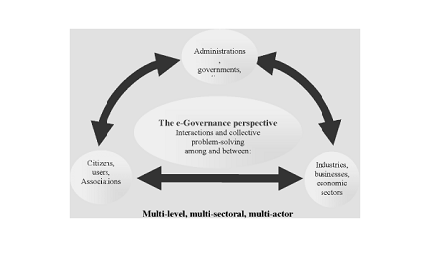Definition of Government:
Government, a public organization – is part of a broader governance system. It is a means to a goal.
These days, government is seen predominantly as a public organization set up by a society for the purpose of pursuing that society’s development objectives. This comprises articulating the society’s development-related demands, proposals and needs, aggregating them and implementing responsive solutions. Enjoyment of public consent constitutes the source of government’s legitimacy. Transparency is a condition sine qua non for government’s accountability vis-à-vis its oversight body.

Definition of Governance and Good Governance:
The term “Governance” refers to a multifaceted compound situation of institutions, systems, structures, processes, procedures, practices, relationships, and leadership behavior in the exercise of social, political, economic, and managerial/administrative authority in the running of public or private affairs.
Good Governance is the exercise of this authority with the participation, interest, and livelihood of the governed as the driving force.
(Governance and Public Administration Branch, Division for Public Administration and Development Management, Department of Economic and Social Affairs, General Secretariat, United Nations – GPAB/DPADM/UNDESA)
Definition of Local Government, Local Governance and Good Local Governance:
Local governments are administrative offices of an area smaller than a state. The term is used to contrast with offices at nation-state level, which are referred to as central government, national governments or (where appropriate) federal governments.
Local governance refers to the exercise of authority at local community level. (GPAB/DPADM/UNDESA)
Good local governance is the exercise of economic, political, and administrative authority to better manage the affairs of a locale. (LOG-IN Africa, CAFRAD/IDRC)
ICTS, Internet Government and Internet Governance:
The overall objective of improving the governance systems and the performance of the public administration at all levels, enhancing the delivery of the public services to all citizens, can greatly benefit from the integration of ICTs in the process of decision making, planning, co-ordination and management carried out by governments. But what are ICTs and why should we integrate ICTs in the government process?
On a point of definition we talk of ICTs, adding “communications” to the more familiar “Information Technology”. This reflects the increasing role of both information and communications technologies in all aspects of society. Generally speaking, ICTs are defined by Stevenson in his 1997 report to the UK government and promoted by the new National Curriculum documents for the UK in 2000 as: “The study of the technology used to handle information and aid communication”. But what we are interested in, more than the study of technologies is the application to improve and “channel” information through any means of communication, based on different infrastructure. So it is important to understand what is information and what is communication. The World Bank defines ICTs as a generic term, which includes Information Technology (hardware and software) and the telecommunication infrastructure, equipment and services.
In this connection, it is worth underlining the role of ICTs as a tool for development, and not as a goal in itself. Using ICTs can help achieve development goals. This is particularly true in relation to government operations and governance in general. The integration of ICTs in governmental operations introduces the concept of Internet Government, Electronic Government, Digital Government or – in short – e-government.
According to the OECD (Organization for Economic Co-operation and Development), the definitions of e-government or Internet Government fall into three groups:
– e-government is defined as Internet (online) service delivery and other Internet-based activity, such as e-consultation;
– e-government is equated to the use of ICTs in government. While the focus is generally on the delivery of services and processing, the broadest definition encompasses all aspects of government activity;
– e-government is defined as a capacity to transform public administration through the use of ICTs or indeed is used to describe a new form of government built around ICTs. This aspect is usually linked to Internet use.
In this regard, it is assumed that “the strategic use of ICTs in government can result in a more inclusive, effective, efficient, transparent and accountable public administration, which will be key to improved economic development and competitiveness. Moreover, in enhancing the quality and delivery of public services through ICTs – especially in education, health, social security and social welfare – government may be better positioned to reduce poverty, redress inequality, and promote sustainable development”
Internet governance is the development and application by Governments, the private sector and civil society, in their respective roles, of shared principles, norms, rules, decision-making procedures, and programs that shape the evolution and use of the Internet – UN WGIG (United Nation, Working group on Internet Governance).
In other words, Internet governance is collective decision making by owners, operators, developers, and users of the networks connected by Internet protocols to establish policies, rules, and dispute resolution procedures about technical standards, resource allocations, and/or the conduct of people engaged in global internet working activities. (The Internet and Global Governance: Principles and Norms for a New Regime, by Milton Mueller, John Mathiason, and Hans Klein).
Therefore, in a point of conceptualization, we must take into consideration the multi-dimensional aspects of ICTs when discussing e-governance. In this regard, in a simple but, in our opinion very effective way, e-governance can therefore be defined as: the Governance “with and of” ICTs.
















